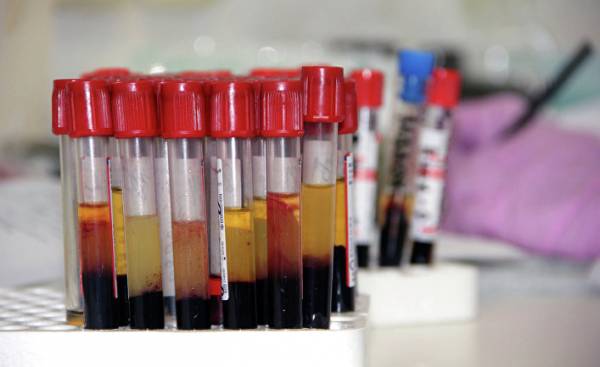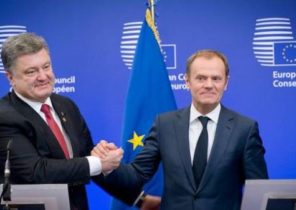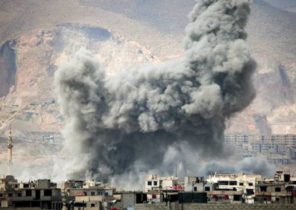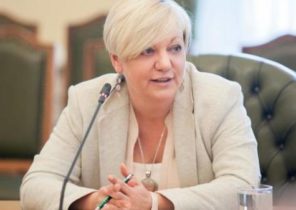
For HIV-infected residents of Eastern Ukraine to fight with Pro-Russian separatists is not only a question of honor but also a struggle for the right to stay alive.
Last year one rainy autumn day a longtime activist in the fight against AIDS Olga Palamarchuk brought me into their new home in Odessa. To call it a house would be an exaggeration; it was about dank basement in a rehabilitation center for social adaptation of former drug addicts. But Olga and her teenage daughter was happy with what I have a roof over my head two years later after he fled from Donetsk, the epicenter of the conflict between Ukraine and separatists backed by Russia in the Eastern part of the country. Olga belongs to the category of displaced persons, whose number in this war is estimated at about 1.7 million. In 2013 and 2014, she participated in mass demonstrations in the Central square of Kiev, Maidan Nezalezhnosti, and also in local promaydanovskih protests in Donetsk, where she was brutally beaten by “titushky,” or mercenaries, thugs. Soon armed men — Russian antimaydanovskogo supporters of the separatist movement — was shot and rushed with fists on everyone. “I have had the strength to laugh at the explosions, told me Olga. But when the fighting began on our street, I knew it was time to leave.” Olga and her mother sat down on the penultimate train from Donetsk; daughter Olga had already left the city.
The flight Olga from Donetsk, where she spent most of her life, her fate is not the first watershed event. She found out that AIDS in 1997, when she was eight months pregnant. Shortly thereafter, she went into labor and she called an ambulance; when she told the Manager about my HIV status, they refused to take it. Then she called again from the neighbors and this time waited a little to reveal the truth about his illness until until I was in the ambulance. In the nursing home they called her a prostitute and a drug addict, even though she didn’t smoke cigarettes. Olga was told that no it does not help that no one touches her, although she brought to doctors gloves and other protective equipment. (The fact that the patients bring to the hospital their own basic medical supplies common here). Olga has given birth with minimal medical care after an unsuccessful attempt to run home to his mother. The doctor was stunned when newborn daughter Olga was healthy; it was as if they expected to see a monster. However, according to doctors, the child was not supposed to live more than three years. The hospital staff bragged about Holguin HIV status so that everyone treated her like a pariah. A negative result of HIV test of my daughter Olga was pure luck, because Olga did not provide medical treatment for prevention of HIV transmission from mother to child.
Two cases of exclusion that have marked the life of Olga — the discrimination to which she was subjected after his diagnosis, and forced relocation in the period of military conflict — also outline the boundaries of post-Soviet struggles of its own country. The brutality with which she faced at the hospital in 1990-e years were typical for Ukraine and for Russia, a relic of the Soviet period, when people suffering from stigmatized diseases or any addiction, was perceived as socially useless and even as criminals. The path traversed by Olga for the years that she lives with her diagnosis, on the one hand, testifies to the fact that Ukraine is moving away from the approach of the Soviet type. The country has accepted Western aid and gave the course of the development of non-governmental organizations that struggled fighting for the health and rights of their communities. In my city, Olga found a club “Svitanok” in which former drug addicts and HIV-positive people provided medical and social services; soon she too started working there, and her life has changed dramatically.
But the war turned everything on its head. Olga and her colleagues in “Svitanok” was forced to leave their homes. They and other East Ukrainian organizations in combating HIV threatened the prospect of all their hard work goes down the drain, that their community would be exposed to harassment and becoming ever more vulnerable. In many ways, the separatists were fighting for to make Eastern Ukraine more like Russia. Meanwhile, members of the “Svitanok” was fighting for his dignity — and, indeed, for their lives.
In the 1980s, when the HIV epidemic devastated communities around the world, the Soviet Union continued to deny it. The Soviet leaders with their unwavering faith in an ideological power of propaganda claimed that AIDS is a disease of the decadent capitalists and Africans from third world countries; in the USSR, it can not be. Hiding the information about drug users and homosexuals, officials were convinced that they are powerless to prevent the existence of these groups. This tactic had the opposite effect: vulnerable people pushed to activities with a higher degree of risk and at the same time, denied them access to medical care or even basic information about HIV transmission.
After the collapse of the Soviet Union the situation has not improved. Together with the government collapsed and the health system, and to start spreading in the West program on HIV testing, prevention and treatment, lacked the resources — and political will too. Only when a significant number of pregnant women and conscripts began to show positive results for HIV, it became clear that Ukraine and Russia, the most affected of the countries of the former Soviet Union, was at the epicenter of the rapidly growing epidemic of HIV infection which is spread mainly through reuse of syringes during drug use. And even then, the Russian and Ukrainian government officials did not take the time to make the necessary arrangements, staying true to Soviet ideas about “socially useless” drug users in rehabilitation through punishment.
However, over time, the two countries significantly diverged in their approaches to HIV and drug use. When Russia from the chaos of the 1990-ies went to the authoritarian regime of Vladimir Putin, she twice has strengthened pronounced anti-Western approach to HIV, close in spirit to Soviet. Russian drug users were recorded in the police registries, they were refused treatment, and sometimes placed them in the same psychiatric institutions, which once was a prison for Soviet dissidents. Opioid substitution therapy with use of methadone and buprenorphine — effective form of HIV prevention for people suffering from dependence on opiates, as well as effective treatment of addiction was recognized as a Western conspiracy against Russia and banned. Needle exchange, which was launched in the late 1990s and early 2000-ies with the support of international organizations to provide assistance, were under threat of legal process and their social workers have earned the stigma of “foreign agents”. Laws against “homosexual propaganda” have made the dangerous spread of any information about rights or about the health of LGBT people, and the government permitted, if not openly sanctioned, horrific campaign of vigilance against the gay community, sex workers and drug users.
Post-Soviet Ukraine, more than Russia is open to international assistance and advice, took a different approach. Across the country, opened offices, launched a program of treatment with methadone and buprenorphine, as well as the established system of services for patients with HIV. In comparison with Russia, Ukraine offers a more conducive environment for NGOs and political protection, in the cities there were local groups working on HIV. In 1999, HIV-positive activists founded the all-Ukrainian network of people living with HIV/AIDS to assert their rights and access to medical care. Those who suffered from HIV and drug use are often their ardent supporters, in the end, the network has become one of the main recipients of international grants for services related to AIDS, thereby contributing to the significant progress of Ukraine in the fight against HIV.
Although the HIV epidemic in Ukraine continues to grow, patients have access to prevention, treatment, and can count on support. Ukraine has significantly increased the amount allocated by the state for the treatment of HIV infection, and in November of 2016, announced that in 2017 will completely Fund the program on opioid substitution therapy, which for the past 12 years supported the global Fund to fight AIDS, tuberculosis and malaria. It’s even more noticeable the contrast between Ukraine and Russia, where doctors can’t even speak freely about replacement therapy.
Russia and Ukraine started in very similar situations: crumbling and extremely corrupt Soviet system of health care, a minimum of knowledge about the prevention and treatment of AIDS and also in terms of the raging epidemic of HIV infection which is spread through injecting drug use. So unlike the reaction to HIV largely reflect differences in the understanding of a countries own national identity and geopolitical position. In an effort to regain the status of superpower, Russia under Putin has established in mind about your own uniqueness and have developed hostility towards the West. The Russian government rejects international aid, justifying it by the fact that such a great state don’t need external support, it rejects Western experience and expertise, on the grounds that the Russian’s always the best way. It cultivates the crazy idea that methadone is a conspiracy to enslave the Russians, and international assistance is a cover for espionage, while itself refusing to take basic steps to protect the health of its citizens.
On the other hand, Ukraine has never claimed the status of a superpower. Being in a weak economic position, sandwiched between Russia and the EU, Ukraine has felt a thin line, trying to maintain their independence and at the same time recognizing that she needs help. It actively sought international assistance (and sometimes squandered it for other purposes, given the extremely high level of corruption), it also took the help of international experts, although the reform of the health system in the country was no easy task. Despite the fact that the Ukrainian political system is largely unable to cope with its functions, it has not undergone the process of consolidation of authoritarianism in the form in which we see it in Russia. Although organizations such as the all Ukrainian network of people living with HIV/AIDS face numerous challenges, they are able to continue their work. From the point of view of people living with HIV, and injecting drug users, the weaker geopolitical status of Ukraine is a significant advantage.
However, the geopolitical weakness has its costs. For the Russian government, the vulnerability of Ukraine became an occasion to demonstrate its military power and cultural chauvinism. And the current war from its very beginning is the cost of lives of Ukrainians with HIV.
In 2003, six years after Olga found out about her diagnosis, she finally visited the Donetsk center for the treatment of AIDS. There she met a social worker from the local self help group “Svitanok” (“sunrise” in Ukrainian), which was founded by HIV-positive activist Svetlana Moroz to support drug users and people living with HIV.
Frost began using drugs in 1995 while still a teenager in Donetsk. In 1998 she managed to quit thanks to the support of a former drug addict, who organized a self-help group in Kyiv, and soon she decided to return to Donetsk and to establish his own group. Over time, the club Svitanok has expanded to offer a wide range of social and health services, as well as defending the needs of HIV-positive people and drug users. (In Donetsk, was one of the highest rates of HIV infection in Ukraine and in Europe in General, another serious problem is the multi-drug resistance, which is more prevalent among people with HIV do not receive treatment, and among prisoners). “Svitanok” took Olga under his wing and she became one of the social workers of the organization. It was not just a job — Olga became a member of a cohesive group of friends, selflessly helping each other and those who were in a similar situation.
When in the winter of 2013-2014 on Maidan began to protest, “Svitanok” actively supported the demonstrators. Activists in the fight against AIDS, the choice between Russia and Europe is not in doubt, it was a choice between life and death. That’s why in the spring of 2014 when separatists was proclaimed Donetsk people’s Republic, the staff of the “Svitanok” was not on the wrong side of new borders. Soon they are scattered in different Ukrainian cities, had to find shelter wherever possible.
Svetlana Moroz spoke about the experience of the Odessa forum for HIV-positive women, which took place in September last year. Blonde, wide-eyed, she bitterly described is not familiar to the staff “Svitanok” the troubles: the shelling, food shortage, martial law. (Her own husband early in the war went as a volunteer in the Ukrainian battalion and spent several months in captivity by the separatists.) “Another injury is a loss for us, which we have invested so much, parting with our favorite colleagues, — said Svetlana. But we found a way to continue their activities, to continue to support each other even despite the fact that we are separated by distance.” In a military conflict they have lost their homes and their former lives, but didn’t want to leave the organization so painstakingly created, or to stop half-way, which has given them such great efforts.
Most customers “Svitanok” in Donetsk, with no wherewithal to move. According to Natalia Baselevel, Director of “Svitanok”, these people were beaten, locked in cellars or were forced to work on the separatists to fill sandbags for barricades. Some of them had to Rob a dilapidated or abandoned houses.
With regard to policies concerning HIV and drugs, “it’s like a return to ten years ago or even more,” says Basilieva. Donetsk people’s Republic has developed a “policy” to HIV in a sample of Russian — ie, in fact, patients were not given medical assistance. Besliev said that in Donetsk still has a “semi-underground” harm reduction program, where employees secretly pay for the distribution of syringes and condoms. (In Donetsk and Lugansk, there are a number of such programs.) The number of clients has increased dramatically; many of them now live without a roof over your head, with the acute shortage of food and clothing. Many families divided by the border, there are higher rates of overdose from taking illicit drugs. According to employees “Svitanok”, reduced access to health services coincided with a higher degree of availability of opiates, while a much larger number of illegal methadone seeps through the porous border with Russia (ironic, given that the health methadone is recognized as illegal there), also readily available opium was the poppy, growing in abandoned fields. In the context of arbitrary violence, deprivation and insecurity opiates offer suffering people relief, which, however, carries with it self-destruction.
Members of the “Svitanok” sent all its forces to resist. By January 2016, they came to the conclusion that the Donetsk people’s Republic required a clandestine medical supplies. In this area here-that was supposed to end with antiretroviral drugs, which threatened the local HIV-infected people, including children, dangerous interruptions of treatment. TB patients in many cases of severe and deadly form of tuberculosis with multiple drug resistance — are faced with the same problem. It was clear that international organizations such as the global Fund and UNICEF will not be able to arrange official delivery.
“Svitanok” decided that they need smugglers, and they will all be women. It is not only that women have long been in the forefront of Ukrainian activists; in this kind of clandestine work, they have certain advantages. Since women actively undergoing in Ukraine layoffs, they can get to where men the road is often closed, unable to persuade the guards so as not able men. (Meanwhile, women are more vulnerable. According to the United Nations Fund for population, the conflict in Ukraine led to a sharp increase in cases of sexual violence committed with impunity by soldiers on both sides).
One of the first women sent medicines across the border, was a social worker named Irina (I changed her name), who went on a journey with two colleagues, also remaining in Donetsk. Three women came to the territory controlled by Ukraine and received a consignment of antiretroviral drugs from the all-Ukrainian network of people living with HIV / AIDS. The doctor gave them an official document stating that the drug in the car intended for the personal use of passengers; they knew that they would have problems if they honestly say that these drugs will go to the distribution.
When they almost reached the “gray zone” between controlled Ukraine territory of the Donetsk people’s Republic, Irina went to a Ukrainian checkpoint on foot and showed the guards my official documents. Unfortunately, the helpful doctor listed the real cost of the drugs, although “Svitanok” got them for free. Seeing a fairly high price, the guards demanded a bribe. Irina was able to pay off and together with colleagues I continued the crossing of the “gray zone”.
On the other hand, the border guards of the Donetsk people’s Republic demanded more bribe, which she already could not afford. When she was told that the box with the tablets will have to leave, Irina villages and announced that it will not budge until she would be allowed to cross the border. “I have HIV,’ she said, and, if you don’t let me pass with my medication, I will die.” Finally, she was allowed to stay at the nearest to the border of the village and to call the local centre for the fight against AIDS, which helped negotiate her passage across the border.
During the next trip on rough roads from the shells, past bombed-out buildings, Irina made sure that her documents did not indicate the price of smuggled drugs. When she got out of the car and asked to speak to the person in charge, she was surrounded by guards; if he saw a young woman, they assumed she hopes to jump the line, possibly preparing a bribe.
The message of Irina that she has HIV and tuberculosis, they are somewhat puzzled, though it cannot be said that they treated her as an enemy. The woman passed through several checkpoints and a number of interrogations with a gauze bandage on his face. The border guards also wore masks for fear of infection.
Despite all the hardships of the DNI is much freer from prejudice in comparison with LC. Policy of Luhansk in the field of healthcare is a copy of the Russian, and the Republic is no drug treatment scientifically proven methods or HIV prevention. Lugansk national Republic even opposes the distribution of condoms, defending ultratraditional ideas about the nature of women, whereas the catastrophic economic situation in the region makes women more and more often to sell themselves in exchange for food. As in Donetsk, social workers remaining in the separatist-controlled Lugansk, continue to provide clandestine medical services, even working in the shelling.
They also help the unfortunate inmates who are in prisons in territory controlled by the separatists and those who have been recently released and who is going to have a hard returning home to the Ukrainian territory. People released from prison, there is often the feeling that they are transported to an unfamiliar future; the Ukrainian prisoners released in the separatist republics, are in a kind of parody of the past. Like they did back in the years when HIV-positive people have not been treated as patients, drug users were deprived of the right to health care. He returned to Russia.
Meanwhile, in the fall of 2014, when the new government of the people’s Republic had banned the transportation of medicines, food and other goods into their territory to smuggle contraband in Lugansk, it became much more difficult. Valeria Rachynska, a former sociologist from the Lugansk region, which is now available in the all-Ukrainian network of people living with HIV/AIDS, told me that during one of the journeys made in that period, she and her colleagues have considered the special agents, saboteurs. They were interrogated and searched for five hours, the border guards checked the contents of each box, each bag, looked over every sheet of paper, checked the tubes with toothpaste.
“We danced, we begged, we threatened, we cried, says Rachynska, but we always managed to pass through the border… We were ready to do everything necessary to ensure that antiretroviral treatment is available on both sides of the dividing line”. Once they were told that they only have an hour to get through the border before the bombardment started. After the end of 2014 the bombing had destroyed the only available for cars checkpoint in Luhansk, Rachynska and her colleagues — again, almost all women made the trek, carrying their precious cargo in bags, backpacks or plastic bags, dragging along side by side with many unhappy that embarked on a long dangerous journey to ukraiskih site to buy products or drugs, or to collect their pension.
At some point, the two peers Rachinskaya went with antiretroviral drugs in a prison in the town of Krasny Luch, in the territory controlled by the separatists. At that time there was active fighting, and women risked artillery fire or run into a mine. They were able to prevent the interruption of the treatment of prisoners. “Two skinny girls, each weighing about 45 pounds, was able to do something that was not under force to the whole government,” said the Rachynska.
This illegal method of smuggled drugs were dangerous and were only permitted in the case of small parties; even when it was supplemented by the periodic intervention of NGOs such as “Doctors without borders” (MSF), it obviously should be replaced with more formalized ways. However, the Ukrainian activists in the fight against AIDS and the international agencies for assistance was very hard to convince the authorities in Kiev and separatist enclaves to come to any concrete agreements. The Ukrainian government has done everything possible to maintain the blockade, through which it hoped to take the separatists into submission. The hardliners claimed that any person remaining in the separatist-controlled areas, could be considered a traitor and didn’t deserve any help. (In fact, many with disabilities, elderly people or those who do not have the financial means, or those who could not leave relatives or friends left because they had no other choice). In the summer of 2015, the security Service of Ukraine has introduced a checkpoint system to control access to areas occupied by the separatists, and thereby severely restricted the legal possibilities for the delivery of medicines. During this period, the activists, carrying drugs through the “gray zone”, risked to be subjected to double punishment. Nevertheless, they continued to fulfill his dangerous mission.
In the end, the global Fund has provided UNICEF emergency grant in the amount of 3.6 million USD. The organization was able to negotiate the medical supplies to the Donetsk people’s Republic starting in August 2015. They managed to get cooperation from the Ukrainian government, which learned a more humane approach to the separatist areas, despite pressure from the nationalists, who demanded to resume the blockade. Irina club “Svitanok” told me that, when in September 2016, she was carrying a batch of medicines, Ukrainian border guards behaved decently and were sympathetic. The last of the five antiretroviral supply was implemented in November 2016, now of medication should be sufficient until mid-2017 — by this time already scheduled another party. The global Fund approved a grant by which the drugs will be available until mid-2018. After that, the future remains uncertain. Ukraine’s economy is in danger, and in an era of austerity and isolationism in the US and Europe, international assistance is increasingly under threat.
By the end of 2017 to approximately 12,500 patients in the separatist cities of Donetsk and Luhansk will require HIV treatment. The current arrangement is only a short term solution. According to Michel Kazatchkine, special envoy of the UN Secretary General on HIV/AIDS in Eastern Europe and Central Asia, given that the conflict is unlikely to be resolved in the near future, the most viable long-term solution may be the inclusion of the agreement on financing of HIV treatment and drug-resistant tuberculosis among the topics of international negotiations, which have become two of the (generally unsuccessful) of the Minsk agreement on a ceasefire and the road map to end the conflict. “In the coming months if a solution was not found, Kazatchkine wrote in a recent commentary for The Lancet HIV, the region may again be at risk of treatment interruption, HIV and drug-resistant tuberculosis, which will lead to a regional health crisis”.
Unfortunately, the rapidly changing political situation in Ukraine, Europe, Russia and the United States makes such arrangements as never shaky. (Agreement on a ceasefire in the conflict routinely violated by both parties.) The separatists are unpredictable and can at any time cancel the data UNICEF permission; they have been expelled from their territory many who worked there aid groups, including MSF. Delivery UNICEF does not include medicines for the treatment of tuberculosis or laboratory supplies; activists continue to carry them informally, and ship in refrigerated containers of blood samples for diagnostic tests, which are not possible to do on the territory of the separatists.
After a lull such trips again become dangerous. The sharp escalation of the conflict started in January, opinions were divided as to whether it was the Ukraine’s attempt to move forward before the newly elected President of the United States Donald trump changed the political calculation, an attempt to make Ukraine from Western aid, or a strategic move on the part of Russia, where the election trump emboldened. In late January, Ukrainian nationalists began informal and illegal physical blockade of the railway lines used to transport coal and other industrial goods between controlled separatist regions and Ukraine. In response, the separatist leaders took control of belonging to Ukraine coal mines and steel mills located in their territory, promising in this case to sell these products in Russia. In mid-March, the Ukrainian authorities finally arrested some of the demonstrators are nationalists, but then Kiev has officially stopped all freight movements from the separatist zones, demanding that Pro-Russian separatists returned to the Ukrainian enterprises. All rail and road connections will be closed as long as the separatists begin to comply with the requirements of Kiev. President Petro Poroshenko said that in areas controlled by separatists, is allowed only for humanitarian goods, but it is unclear how this is feasible because the relationship between Kiev and the separatists become even more strained.
The future of HIV treatment and tuberculosis in the East of Ukraine remains uncertain, but the Ukrainian activists in the fight against AIDS are committed to do everything possible to save him. With unwavering dedication in helping one of the most vulnerable groups of our society, even with serzno risk to their own lives, these activists believe that implementing the best of Western values. As long as the conflict continues, let’s hope that the West would agree with that.
Reporting for this article was made with support from the Pulitzer center coverage of crises.







